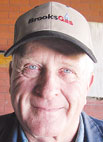
Paul Wimsatt grew up on a dairy farm southwest of Monett, Mo. He went to Monett High School and was involved in the FFA. Janet Wimsatt grew up in Purdy, nearby. “I was a city girl, I guess you could say,” she said with a smile. The two met in Monett in 1988, and were married early in 1990.
After living in town for seven years the couple decided to look for a small piece of land outside city limits. “We found this 120 acres with an old farm house on it and it just seemed perfect,” said Janet. They leased the land and lived in the farm house until they decided they wanted their own butcher calves. That decision made, the Wimsatts began in beef, and “we haven’t bought beef at the store in 10 years,” said Paul.
They bought a Charolais calf and a Limousin-cross calf. The couple recalled the story that secured their love for the Charolais breed. “The Limousin calf got sick and went blind, and the Charolais calf led her around to feed and water. When the blind calf got in the pond, the Charolais would get her out and lick her. We fell in love with the mothering instincts that the calf had shown, and that is how we got involved with Charolais.”
Soon after that experience, Paul and Janet bought four Charolais, non-registered heifers from Jim Fohn.
“They were mostly pets,” added Janet. They also bought a registered Charolais bull with their neighbor. Soon they started going to sales and bought their first registered cow. As the herd grew, the neighbor who had been leasing their land decided not to renew his contract in an effort to encourage the Wimsatts to delve into production agriculture. They agreed. The farm has been growing ever since.
“We just kept going from there,” said Paul. They increased their number of registered animals and now they’re up to 25 momma cows. In the past few years they’ve started doing strictly artificial insemination and embryo transplants. Greg Lenz does all of the embryo work for the couple, who breeds in a 90-day window. “We haven’t owned a bull for five years,” said Paul.
Janet added, “We have a few alfalfa fields that we bale several times a summer, and we invested in our own green tractors.” The Wimsatts do rotational grazing and calve in the spring. “We use no growth hormones, and we’re on the Pfizer vaccination program,” said Paul, who butchers about six of his own steers each year and sells others via private treaties.
In the future Paul and Janet would like to get up to around 50 momma cows. Both of them work full time at Jack Henry and Associates.
“One day I’d like to retire from Jack Henry and only farm full time,” Paul smiled. They have a neighbor who has given them ‘first dibs’ on an adjoining 80 acres to their farm.
“We’re really appreciative of our good neighbors. They’re always ready to come to our aid day or night. We couldn’t do any of this if it wasn’t for their help and advice.”







